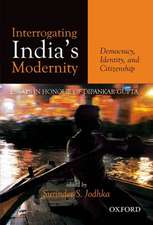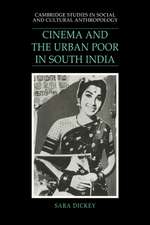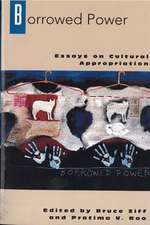Living Class in Urban India
Autor Sara Dickeyen Limba Engleză Paperback – 14 iul 2016 – vârsta ani
Honorable mention, 2018 Ananda Kentish Coomaraswamy Book Prize from the South Asia Council of the Association for Asian Studies
Many Americans still envision India as rigidly caste-bound, locked in traditions that inhibit social mobility. In reality, class mobility has long been an ideal, and today globalization is radically transforming how India’s citizens perceive class. Living Class in Urban India examines a nation in flux, bombarded with media images of middle-class consumers, while navigating the currents of late capitalism and the surges of inequality they can produce.
Many Americans still envision India as rigidly caste-bound, locked in traditions that inhibit social mobility. In reality, class mobility has long been an ideal, and today globalization is radically transforming how India’s citizens perceive class. Living Class in Urban India examines a nation in flux, bombarded with media images of middle-class consumers, while navigating the currents of late capitalism and the surges of inequality they can produce.
Anthropologist Sara Dickey puts a human face on the issue of class in India, introducing four people who live in the “second-tier” city of Madurai: an auto-rickshaw driver, a graphic designer, a teacher of high-status English, and a domestic worker. Drawing from over thirty years of fieldwork, she considers how class is determined by both subjective perceptions and objective conditions, documenting Madurai residents’ palpable day-to-day experiences of class while also tracking their long-term impacts. By analyzing the intertwined symbolic and economic importance of phenomena like wedding ceremonies, religious practices, philanthropy, and loan arrangements, Dickey’s study reveals the material consequences of local class identities. Simultaneously, this gracefully written book highlights the poignant drive for dignity in the face of moralizing class stereotypes.
Through extensive interviews, Dickey scrutinizes the idioms and commonplaces used by residents to justify class inequality and, occasionally, to subvert it. Along the way, Living Class in Urban India reveals the myriad ways that class status is interpreted and performed, embedded in everything from cell phone usage to religious worship.
This book is also freely available online as an open-access digital edition, published with the support of the National Endowment for the Humanities.
This book is also freely available online as an open-access digital edition, published with the support of the National Endowment for the Humanities.
| Toate formatele și edițiile | Preț | Express |
|---|---|---|
| Paperback (1) | 309.24 lei 6-8 săpt. | |
| Rutgers University Press – 14 iul 2016 | 309.24 lei 6-8 săpt. | |
| Hardback (1) | 827.70 lei 6-8 săpt. | |
| Rutgers University Press – 14 iul 2016 | 827.70 lei 6-8 săpt. |
Preț: 309.24 lei
Nou
Puncte Express: 464
Preț estimativ în valută:
59.17€ • 61.78$ • 48.97£
59.17€ • 61.78$ • 48.97£
Carte tipărită la comandă
Livrare economică 04-18 aprilie
Preluare comenzi: 021 569.72.76
Specificații
ISBN-13: 9780813583914
ISBN-10: 0813583918
Pagini: 282
Ilustrații: 8 photographs
Dimensiuni: 152 x 229 x 15 mm
Greutate: 0.4 kg
Ediția:None
Editura: Rutgers University Press
Colecția Rutgers University Press
ISBN-10: 0813583918
Pagini: 282
Ilustrații: 8 photographs
Dimensiuni: 152 x 229 x 15 mm
Greutate: 0.4 kg
Ediția:None
Editura: Rutgers University Press
Colecția Rutgers University Press
Notă biografică
SARA DICKEY is a professor of anthropology at Bowdoin College in Brunswick, Maine. She is the author or co-editor of several books including Cinema and the Urban Poor in South India, Home and Hegemony: Domestic Service and Identity Politics in South and Southeast Asia, and South Asian Cinemas: Widening the Lens.
Cuprins
Acknowledgments
Notes on Transliteration and Pronunciation
1. Introduction: The Everyday Life of Class
2. What Is Class in Madurai?
3. Four Residents, as I Know Them
4. Consumption and Apprehension: Class in the Everyday
5. Debt: The Material Consequences of Moral Constructs
6. Performing the Middle
7. Marriage: Drama, Display, and the Reproduction of Class
8. Food, Hunger, and the Binding of Class Relations
9. Conclusions: Nuancing Class Boundaries
Notes
References
Index
Recenzii
"This raw, evocative, and beautifully written book is for anyone interested in class, India, socioeconomic inequality, or ethnography … Highly recommended."
"This innovative analysis builds on captivating stories of everyday life, connecting the capitalist forces we categorize as 'global' with the spaces, practices, and organizations that ground daily experience. It marks an important achievement."
"Dickey has an exceptionally rich longitudinal perspective on how patterns and logics of social organization change and how class shapes lives. She lays out the complex cultural context in and through which material class dynamics operate."
Descriere
Sara Dickey considers how urban Indians’ notions of class and caste are rapidly transforming in the wake of globalization. Introducing the reader to four residents in the city of Madurai from varied backgrounds, she documents their palpable day-to-day experiences of class. By analyzing the intertwined symbolic and economic importance of phenomena like wedding ceremonies, religious practices, and loan arrangements, Dickey’s study reveals the material consequences of local class identities.

















